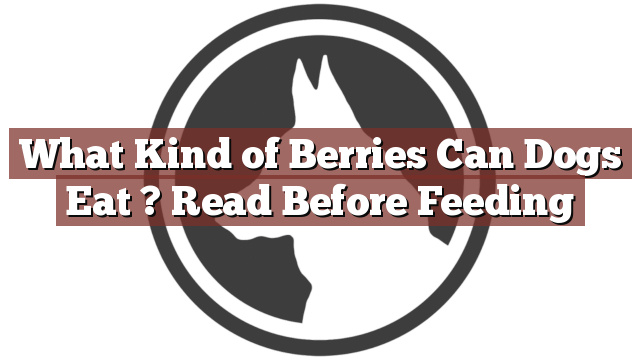Understanding Your Dog’s Dietary Needs
As a responsible dog owner, it is crucial to understand your furry friend’s dietary needs to ensure their overall health and well-being. While dogs are primarily carnivores, they can also benefit from certain fruits and vegetables in moderation. Adding berries to their diet can provide them with essential vitamins, minerals, and antioxidants. However, it’s important to know which berries are safe for your dog to consume and in what quantities. Before introducing any new food into your dog’s diet, it is always recommended to consult with your veterinarian.
What Kind of Berries Can Dogs Eat? Read Before Feeding
Now, let’s dive into the world of berries and explore which ones are safe for our canine companions. While berries are generally safe for dogs, not all types are suitable for consumption. The good news is that several berries provide numerous health benefits for dogs. Blueberries, for example, are packed with antioxidants that can help boost their immune system and promote healthy aging. Strawberries, another safe option, are a great source of fiber, vitamin C, and manganese. Raspberries, blackberries, and cranberries are also safe choices that can provide similar benefits. However, it’s important to remember that moderation is key. Too many berries can lead to an upset stomach or digestive issues.
Pros and Cons of Feeding Berries to Your Dog
Feeding berries to your dog can have both pros and cons. On the positive side, berries are low in calories and fat, making them a healthy treat option. They are also packed with vitamins, minerals, and antioxidants that can support your dog’s overall health and immune system. Additionally, some berries, like cranberries, may even help prevent urinary tract infections in dogs. However, it’s essential to be aware of certain risks and limitations. Some berries, such as grapes and raisins, can be toxic to dogs and should never be fed to them. Furthermore, too many berries can cause gastrointestinal upset, such as diarrhea or vomiting. It’s best to introduce berries gradually to your dog’s diet and monitor their reaction closely.
Conclusion: Ensure Safe and Nutritious Berry Consumption for Your Canine Companion
In conclusion, berries can be a nutritious addition to your dog’s diet when given in moderation. Blueberries, strawberries, raspberries, blackberries, and cranberries are generally safe and offer various health benefits for your furry friend. However, it is crucial to avoid toxic berries like grapes and raisins, as they can be harmful to dogs. Always consult with your veterinarian before introducing any new food to your dog’s diet, including berries. Remember, a balanced and well-rounded diet is essential for your dog’s overall health, and berries can be a delightful and healthy treat to incorporate into their meals.
Thank you for taking the time to read through our exploration of [page_title]. As every dog lover knows, our furry friends have unique dietary needs and responses, often varying from one canine to another. This is why it's paramount to approach any changes in their diet with caution and knowledge.
Before introducing any new treats or making alterations to your dog's diet based on our insights, it's crucial to consult with a veterinarian about [page_title]. Their expertise ensures that the choices you make are well-suited to your particular pet's health and well-being.
Even seemingly harmless foods can sometimes lead to allergic reactions or digestive issues, which is why monitoring your dog after introducing any new food item is essential.
The content provided here on [page_title] is crafted with care, thorough research, and a genuine love for dogs. Nevertheless, it serves as a general guideline and should not be considered a substitute for professional veterinary advice.
Always prioritize the expert insights of your veterinarian, and remember that the health and happiness of your furry companion come first.
May your journey with your pet continue to be filled with joy, love, and safe culinary adventures. Happy reading, and even happier snacking for your canine friend!

